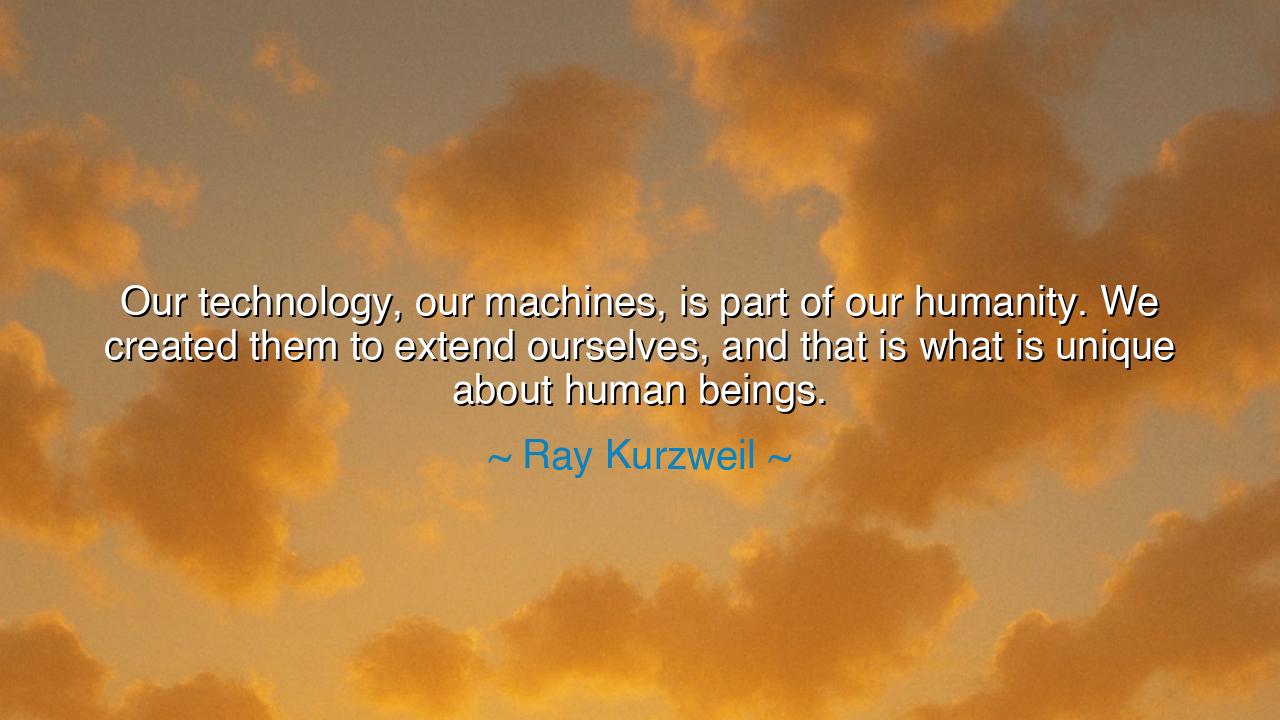
Our technology, our machines, is part of our humanity. We
Our technology, our machines, is part of our humanity. We created them to extend ourselves, and that is what is unique about human beings.






Hear the words of Ray Kurzweil, spoken with the gravity of one who gazes into both the past and the future: “Our technology, our machines, is part of our humanity. We created them to extend ourselves, and that is what is unique about human beings.” These words remind us that the tools we fashion are not separate from us, but woven into the very fabric of who we are. To deny our creations is to deny our nature, for since the dawn of time, humankind has been defined by the will to reach beyond its limits, to take the raw material of earth and transform it into extensions of mind, body, and spirit.
From the first chipped stone tool, humanity declared its destiny. A hand was no longer bound by flesh alone, but lengthened by the edge of flint. With the spear, our reach grew beyond arm’s length; with fire, our warmth and protection extended into the cold night. Each invention was not merely an object—it was the outward expression of inner desire, the shaping of the world to mirror human will. Kurzweil’s words echo this truth: that every machine is but a mirror of humanity itself, a testimony to our longing to be more than we are.
Consider the story of the printing press, wrought by the hands of Johannes Gutenberg in the fifteenth century. Before it, knowledge was confined to the few, chained by the slowness of hand-copying and the scarcity of manuscripts. But with the press, humanity extended its voice across nations and centuries. Ideas traveled farther than armies, and the wisdom of one generation became the inheritance of the next. Was this not an extension of ourselves? Was it not the human voice, multiplied and carried through time by a machine? Thus, the press was not just wood and metal—it was humanity magnified.
The same truth resounds in the creation of the telephone by Alexander Graham Bell. No longer bound by distance, a mother could speak to her child across cities, a lover could whisper across oceans, a leader could command across nations. The device itself was cold, built of wires and coils, yet what flowed through it was warmth, intimacy, power. Here again we see Kurzweil’s teaching: our machines are not alien, but vessels of our own essence, born of the yearning to extend our reach, our presence, our humanity.
Yet let us not forget: what we extend, we also risk distorting. For as our technology grows, so too does its power to shape us in return. A sword can defend or destroy; a network can enlighten or enslave. The danger is not in the tool itself, but in whether we remain masters of our extensions, or become slaves to them. Kurzweil’s wisdom calls us not only to celebrate our machines as part of us, but to remember that they reflect what we truly are—compassionate or cruel, noble or base.
So, O seeker, the lesson is this: do not shrink from technology as though it were foreign, nor worship it as though it were divine. Instead, see it for what it is—a fragment of humanity made manifest. Ask yourself: What of myself do I extend into the world through the tools I build and use? If you extend knowledge, you sow wisdom. If you extend greed, you sow destruction. For in every machine, humanity’s soul is revealed.
Practical steps follow: when you pick up a device, do so with intention. Use it to connect, not to isolate; to create, not to consume without thought; to heal, not to harm. When you build or design, let compassion guide your vision, so that the machines of tomorrow become extensions of our better angels, not our darkest shadows. And above all, remember that every tool is a reflection of the heart that shaped it. Guard your heart, and your technology shall be a blessing.
Thus, remember Kurzweil’s truth: “Our technology, our machines, is part of our humanity.” We are the only beings who extend ourselves into stone, into fire, into wires and silicon. This is our glory, and also our responsibility. Use it well, and you will not only extend your reach—you will extend the very light of humanity into the ages to come.






AAdministratorAdministrator
Welcome, honored guests. Please leave a comment, we will respond soon